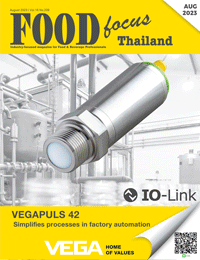แนวทางการปรับปรุงคุณภาพน้ำสำหรับอุตสาหกรรมอาหาร Guidelines for Water Quality Improvement in Food Industry
1733 Views |

BY: รัชชผดุง ดำรงพิงคสกุล
Ratchaphadung Damrongpingkasakul
Health Technical Officer (Senior Professional Level)
Bureau of Food and Water Sanitation
Department of Health, Ministry of Public Health
ratchaphadung.d@anamai.mail.go.th
อุตสาหกรรมอาหารมีการใช้น้ำในปริมาณมากเป็นอันดับสอง หรือคิดเป็นสัดส่วนร้อยละ 12.9 รองจากอุตสาหกรรมอโลหะหรืออุตสาหกรรมที่เกี่ยวข้องกับการก่อสร้างแต่ยังคงมากกว่าอุตสาหกรรมสิ่งทอ การใช้น้ำในอุตสาหกรรมอาหารนั้นมีทั้งการใช้เพื่อเป็นส่วนประกอบของอาหารและใช้ในกระบวนการผลิตอาหาร เช่น การล้างวัตถุดิบ การล้างเครื่องมือหรืออุปกรณ์ การหล่อเย็น และการลำเลียงอาหาร เป็นต้น นอกจากนี้ ยังใช้น้ำเพื่อการอุปโภคบริโภคและการทำความสะอาดบริเวณพื้นที่การผลิตอีกด้วย
การผลิตน้ำให้ได้คุณภาพตามมาตรฐานดังกล่าว อาจจะต้องปรับปรุงคุณภาพน้ำใช้หรือน้ำประปาเพิ่มเติม ดังนี้
1. การกรองผ่านเยื่อกรองแบบละเอียด ได้แก่
- Micro Filtration (MF) เป็นระบบกรองที่สามารถกรองอนุภาคที่มีขนาดใหญ่กว่า 0.1 ไมครอนและกรองแบคทีเรียได้ แต่จะไม่สามารถกรองไวรัสได้
- Ultra Filtration (UF) คล้ายกับระบบ MF แต่สามารถกรองอนุภาคขนาดเล็กกว่า หรือมีขนาดใหญ่กว่า 0.01 ไมครอนได้ ซึ่งรวมถึงแบคทีเรียและไวรัสด้วย
- Nano Filtration (NF) เป็นระบบกรองที่สามารถกรองอนุภาคที่มีขนาดใหญ่กว่า 0.001 ไมครอนได้ ทำให้ได้น้ำที่ยังคงมีแร่ธาตุหลงเหลืออยู่
- Reverse Osmosis (RO) เป็นระบบกรองที่สามารถกรองอนุภาคที่มีขนาดใหญ่กว่า 0.0001 ไมครอนได้ โดยใช้ความดันน้ำมากถึง 30-60 บาร์ ทำให้ระบบนี้สามารถกรองสิ่งปนเปื้อนขนาดเล็กมาก
2. ระบบผลิตน้ำอ่อน (Softening) เป็นการกรองด้วย Cation Resin เพื่อเอาความกระด้างในรูปของ
ไบคาร์บอเนต เกลือ หรือซัลเฟตของแคลเซียม (Ca2+) และแมกนีเซียม (Mg2+) ออกให้หมด
3. ระบบผลิตน้ำปราศจากไอออน (Deionization; DI) เป็นระบบกำจัดอิออนในสารละลายทั้งหมด ทำให้ได้น้ำที่มีความบริสุทธิ์ปราศจากแร่ธาตุ ซึ่งไม่เหมาะที่จะนำมาใช้สำหรับการบริโภค แต่มีประโยชน์เป็นอย่างมากสำหรับอุตสาหกรรมผลิตอาหาร ยา เครื่องสำอาง และเครื่องมืออิเล็กทรอนิกส์ โดยการผลิตน้ำ DI นั้นคล้ายกับระบบผลิตน้ำอ่อน แต่แตกต่างกันที่น้ำ DI จะใช้ทั้ง Cation Resin และ Anion Resin เป็นสารกรองเพื่อกำจัด
อิออนประจุบวกและประจุลบออกจากน้ำ
The food industry ranks second in terms of water consumption, taking up 12.9 percent of the total industrial water usage and following only the non-metal or construction-related industries. It even surpasses the textile industry. The food industry uses water as food ingredient and for food manufacturing processes, such as washing of raw materials, cleaning of equipment, cooling of products, and transport of food. In addition, water is also used for consumption as well as cleaning of production area.
The water production processes that adhere to these standards may implicate the following methods to ensure improved quality of running water or water for general consumption:
1. Membrane Filtration
Micro Filtration (MF) can filter particles larger than 0.1 micron and bacteria, but it cannot filter virus.
- Ultra Filtration (UF) is similar to MF but can filter particles that are larger than 0.01 micron, including bacteria and virus.
- Nano Filtration (NF) can filter particles larger than 0.001 micron, thus allowing some minerals to cross over as a result.
- Reverse Osmosis (RO) can filter particles larger than 0.0001 micron and uses high pressure of 30-60 bar, which enables it to filter extremely small contaminants.
2. Water softening relies on cation resin to completely remove water hardness caused by bicarbonate, salt, or sulfate of calcium (Ca2+) and magnesium (Mg2+).
3. Deionization (DI) is a system that removes all ions from solutions, providing purified water without minerals, which is not suitable for consumption but can be very useful in food, medicine, cosmetics, and electronics industries. The processes involved in the production of deionized water are similar to those in the water softening system. Deionization, however, applies both cation resin and anion resin for filtration of water and removal of positive and negative ions from water.






